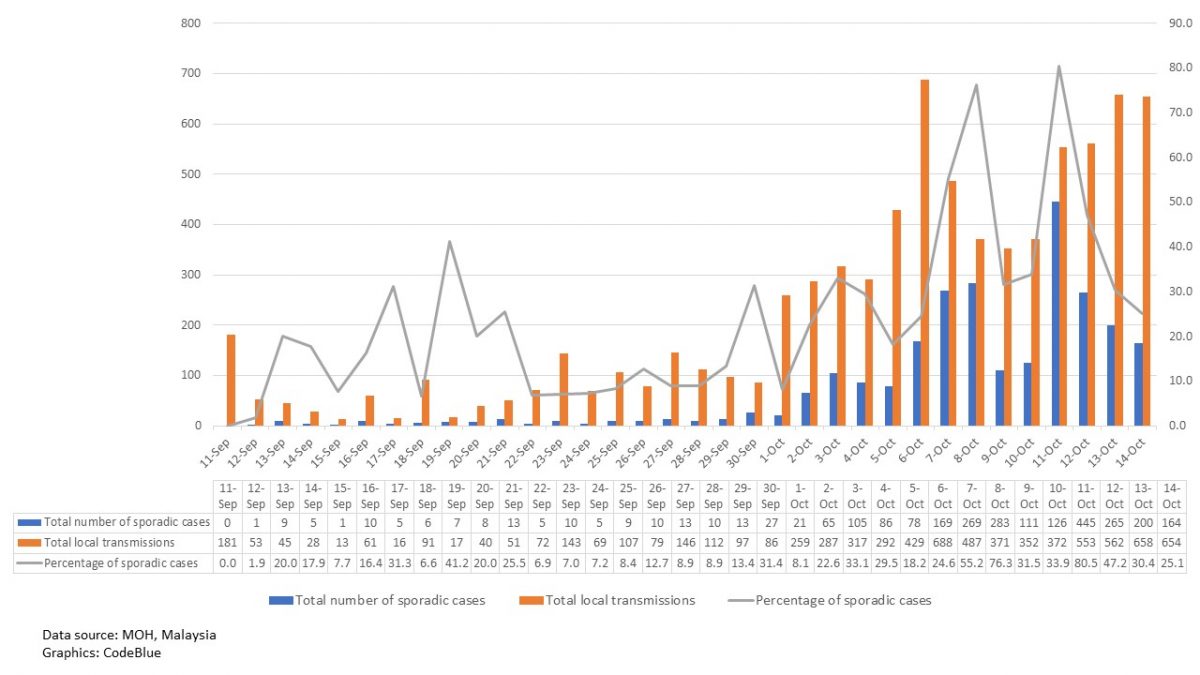KUALA LUMPUR, Oct 16 — Sporadic Covid-19 cases nationwide rose sharply since October 2, increasingly forming a large percentage of local transmissions in Malaysia that indicates the coronavirus is circulating in the community.
Unlinked community cases in the country, whose sources of infection are unknown, increased from about 23 per cent of local transmissions on October 2 to a high of about 81 per cent on October 11, before dropping to about a quarter of locally transmitted cases on October 14. Sporadic cases formed below 20 per cent of Malaysia’s local transmissions in most of the two weeks before the Sabah state election on September 26.
Malaysia’s rising trend of sporadic cases is mainly concentrated in Sabah, as about nine in 10 sporadic cases nationwide have been detected in the east Malaysian state daily since the start of the month. Sporadic cases nationwide in the first two weeks of October averaged about 171 daily. Sabah averaged about 258 total infections a day from October 1 to 14.
Even throughout the Sabah election campaign from September 12 to 26, Sabah formed most of nationwide unlinked infections, although daily sporadic cases in that period numbered below 15.
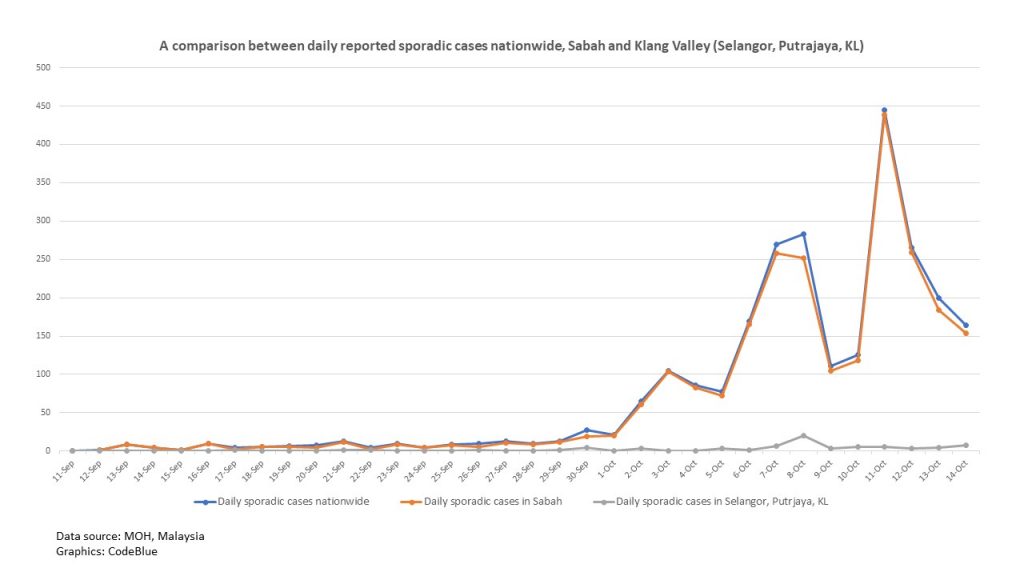
The sporadic cases in CodeBlue’s analysis include influenza-like illness (ILI), severe acute respiratory infection (SARI), health care workers, pre-surgical, pre-wedding, symptomatic, hospital admission, early detainees, community, workplace, ship sign-off, international border, and self-volunteering screenings. The study does not include any imported cases in any of the analyses. CodeBlue’s analysis also excludes Covid-19 clusters, many of which had index cases whose sources of infection themselves were unknown.
Sabah has registered 94.4 per cent of total nationwide sporadic cases from September 11 until October 14.
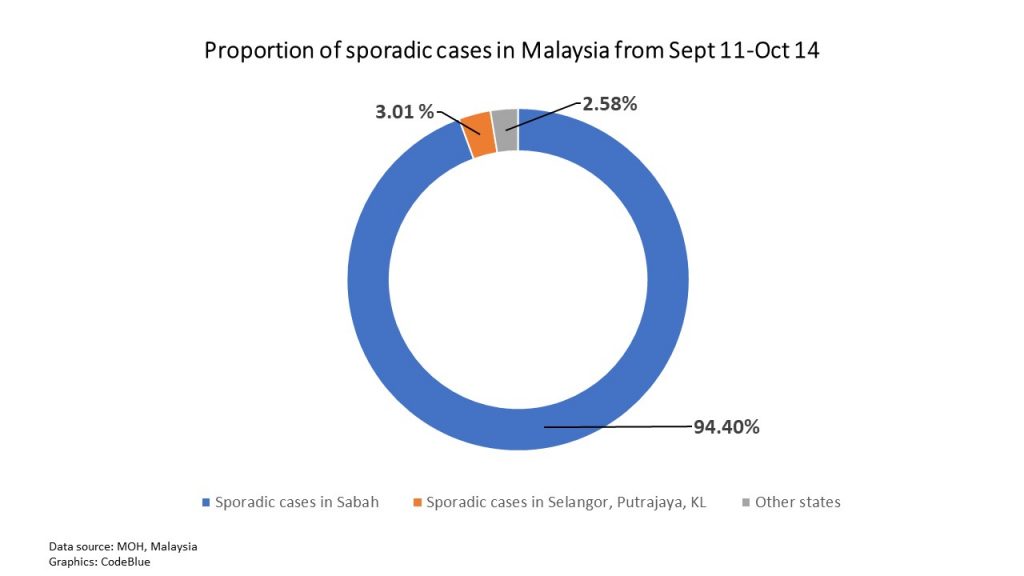
Putrajaya, Kuala Lumpur, and Selangor registered a total of 77 sporadic cases from September 11 until October 14. That carries just 0.99 per cent from the total nationwide local transmissions (7,788 cases) and 3.01 per cent from the total nationwide sporadic cases (2,554 cases) that were reported in the same period of time. It is noted that Selangor reported sporadic cases for seven consecutive days, from October 7 until October 14.
Other states in the country recorded 2.58 per cent of Malaysia’s total sporadic cases from September 11 until October 14.
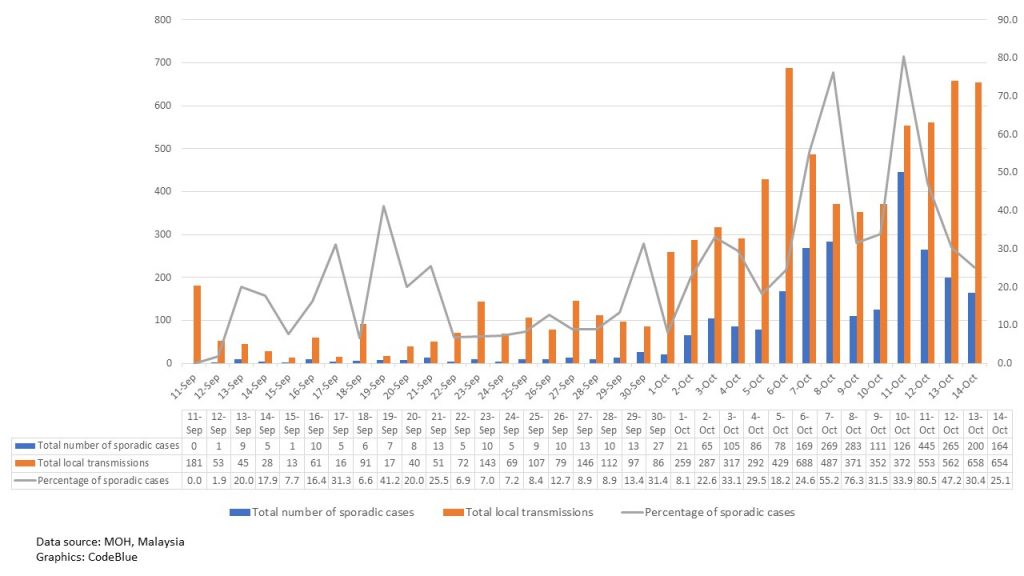
From September 27 until October 14, the country recorded 2,450 sporadic Covid-19 cases. That carries 36.45 per cent from the total of 6,722 local transmissions reported in the same period of time.
Two weeks before the Sabah state election — from September 11 until September 25 — only 94 unlinked cases (9.52 per cent) were reported from a total of 987 local transmissions in the country.
On October 15 yesterday, MOH reported 113 unlinked cases in seven states across the country — Sabah (101 cases), Selangor (3 cases), Kedah (3 cases), Penang (one case), Kuala Lumpur (2 cases), Melaka (one case), Kelantan (2 cases).
Sabah’s Proportion Of Sporadic Cases Rose After Polls
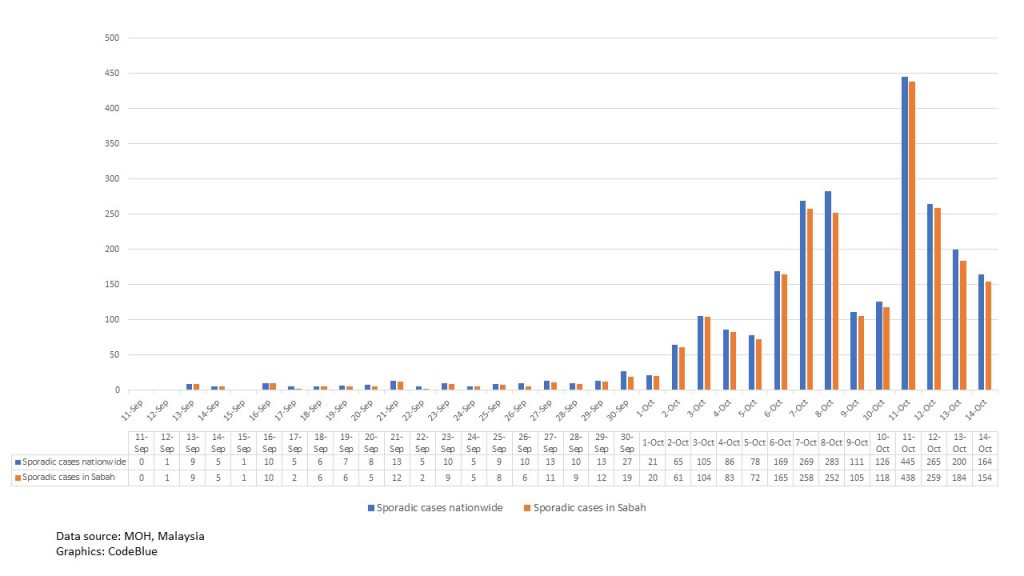
Data shows more than 50 daily sporadic cases have been reported nationwide since October 2, reaching a high of 445 unlinked cases on October 11. Of them, Sabah has recorded more than 90 per cent of cases daily, except October 8 (89.05 per cent), in the same period of time.
Paediatrician Dr Amar-Singh HSS predicted on September 22 a rise in daily Covid-19 cases nationwide and in Sabah, as Sabah has recorded unlinked cases for 10 consecutive days, from September 12 to September 21.
“Even without widespread testing, unlinked cases in Sabah are troubling. Behind each unlinked case is possibly many others. Impact of this on the whole country will be felt in the next few weeks as people travel back or elsewhere in the state. The elections have affected control measures,” Dr Amar said in a tweet.
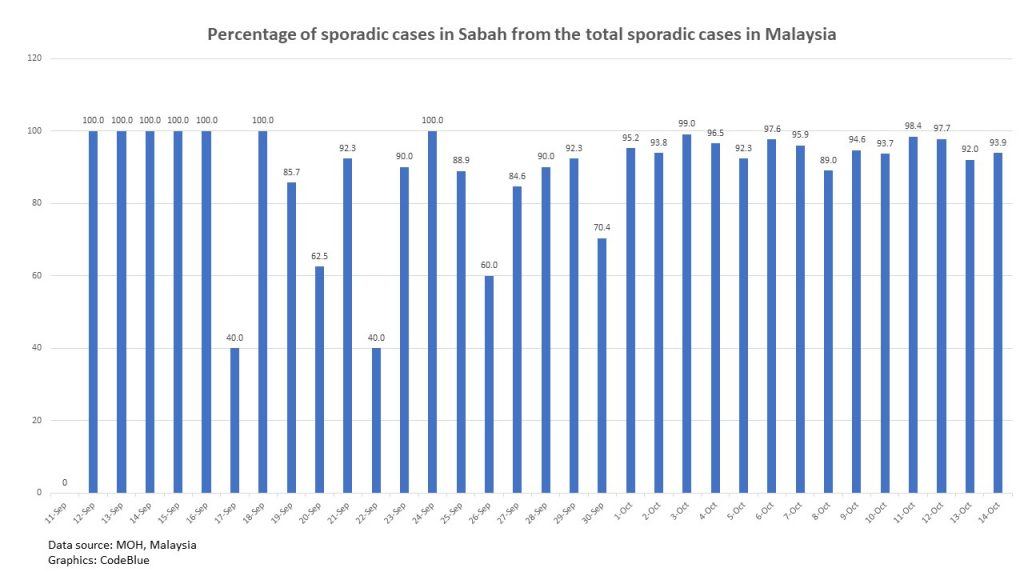
In fact, Sabah has registered even 100 per cent of Malaysia’s daily reported sporadic cases before the election. The daily reported sporadic cases nationwide, however, did not exceed 15 per day from September 11 until September 25.
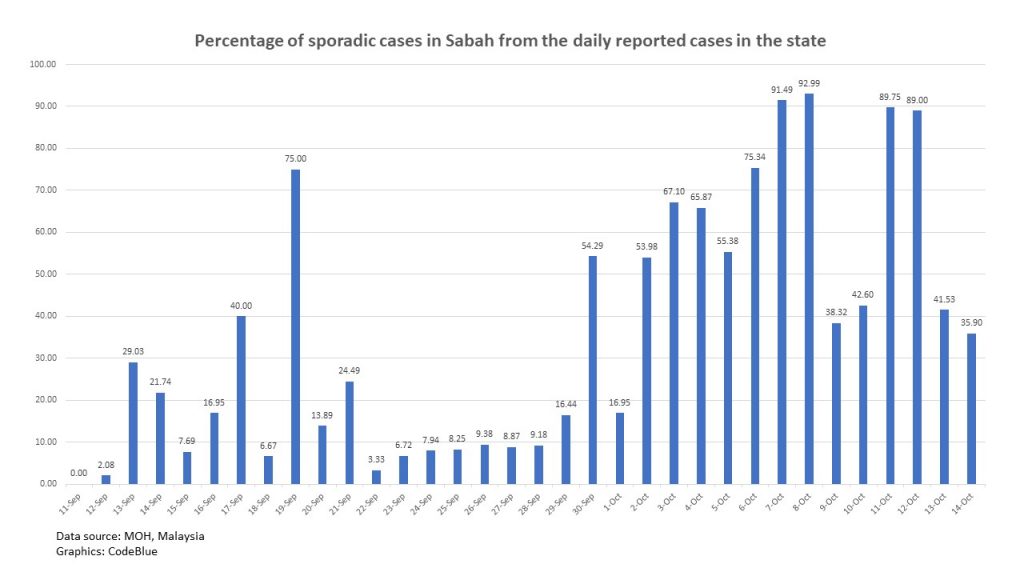
After the September 26 state election until October 14, within a span of 18 days, Sabah saw a total of 12 days when daily sporadic cases formed more than 40 per cent of infections in the state. Nine of 10 reported cases in Sabah were sporadic for four days from October 7 to 8, and October 11 to 12.
Fourteen days before the election — from September 11 until September 25 — only two days saw sporadic cases comprising 40 per cent and above of reported infections in the state. This clearly shows that sporadic cases in the state increased dramatically after the state election.
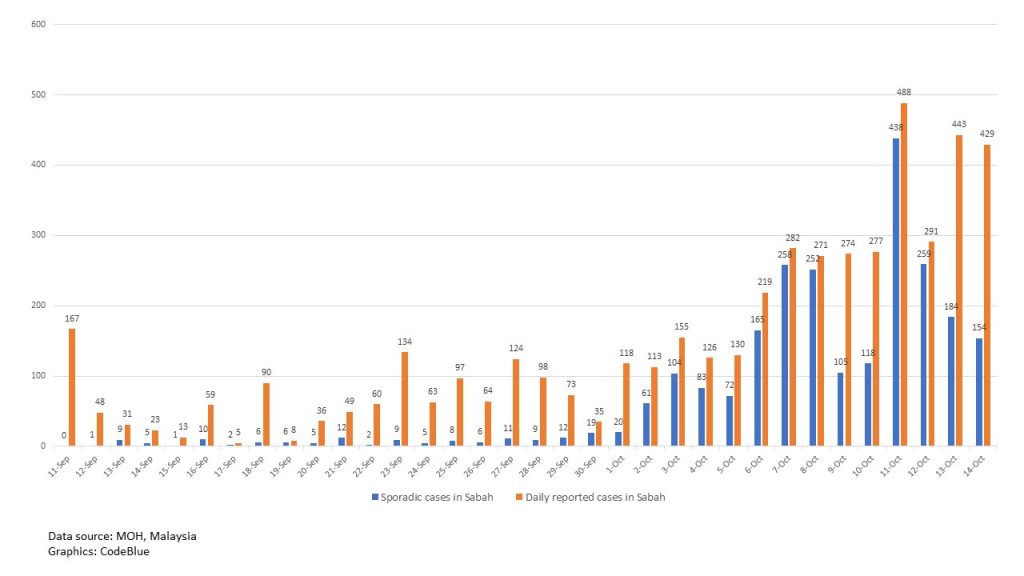
What Does A Sporadic Trend Reflect?
Singapore’s Ministry of Health has stated before that an increase in the number of sporadic cases, including symptomatic and unlinked cases in the community, may reflect an underlying community transmission which has not been identified as the sources of infection are unidentified.
Singapore also stated that quick action is required to identify unlinked cases to curb the virus from spreading in the community, by expanding community tests to people as young as 13 years old.
Dr Amar Singh also mentioned that the reported cases in Sabah illustrate just a small proportion of a much larger outbreak in the state with hidden Covid-19 infections.
“The outbreak may be very huge and we are seeing the tip- deaths and symptomatic individuals,” Dr Amar described the situation in Sabah in a tweet, commenting on a CodeBlue report about 43 per cent of official Covid-19 cases in Sabah turning up with disease serious enough to require hospitalisation.
Can Sabah Cope With Soaring Covid-19 Cases?
Bernama reported that patients younger than 50-years-old without any history of chronic diseases are being treated in the intensive care unit in the Duchess of Kent Hospital (HDOK) Sandakan, and the number is growing.
“Sabah health care professionals are getting exhausted. The numbers are growing rapidly and facilities getting full. We need as much support sent to them as possible. Especially relief manpower. Massive rapid antigen testing is the only way to control this now,” Dr Amar stated in a tweet.
Bandar Kuching MP Dr Kelvin Yii mentioned in a letter to CodeBlue that the daily reported Covid-19 cases in Sabah do not define the complete scenario of the state’s real condition.
Dr Yii strongly believes that expanding testing capacities in the country would reveal more underlying Covid-19 cases in Sabah.
Dr John Teo, an obstetrician and gynaecologist in Kota Kinabalu, Sabah, stated that the lockdown implemented in the state will slow down the infection rate, which eventually leads to capacity rebuilding of hospitals and health care facilities there. He, however, also stressed that the lockdown has led to hungry villagers, as informal workers lose their daily wage jobs.


